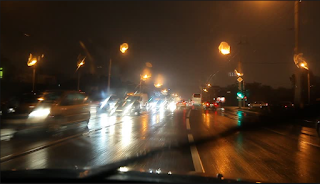
In the last years of his life, my Dad and I had a tradition. I’d call his house most nights while driving home from work. The phone would ring: Three, four, five, six times. He wouldn’t answer.
The machine would kick in and I’d hear my sister’s voice on the recording. He liked her voice on the machine.
I would talk at Pop while the message chirred. That machine was right next to his couch in front of his TV. I knew he was sitting there, 85 years old, under his New York Football Giants blanket. Since the fourth cancer diagnosis, he didn’t like to answer the phone.
“Pop! Pop, pick up! It’s Tommy! It’s your son.”
After a time, I’d stop and tell him about my day, my kids, what was new, and that I was still pulling a paycheck.
Very occasionally, he’d pick up the phone. About once every two weeks. And we’d talk.
I’d ask, How are you feeling (“What do you want me to say”). He’d ask about the job (“Good enough, Pop, but I don’t trust anyone”), the kids (“Grace gets As on her report card and all these little plusses”), the dogs (“They miss you”), and Keith’s therapy.
My son Keith is a trans teenager. He has anxieties and hates himself. He’s sullen, silent, or suicidal. Pick the day. Other times he might smile during dinner.
Pop understood Keith’s moods better than I did. I think Pop had seen more in New York City. He managed lots of different kinds in the fire department and growing up with the corner boys in the neighborhoods. Some desperate, some down. Not everyone gets out of the fire okay.
So he’d ask, “How’s Keith doing?”
Pop didn’t understand ADHD and therapists and kids cutting themselves. He didn’t understand gender fluidity and transsexuality. Homosexuality was a sin against God because The Church told him so.
But Pop saw nothing wrong with my son: “He’s still the same kid, right?”
Same kid, Pop, just a new wrapper. Pop believed God was lucky to have Keith.
“Just tell him it’s going to be all right. Tell him I said that.”
And that was it.
He’d beg off the phone to do something else, anything else. Eat dinner, watch the Yankees. Our calls were maybe 5 minutes.
Dad’s been dead now nearly a year. I’m still here. On my drive to work each morning, I’d check one box off my executor list – handwritten on a legal pad on the navigator seat. Call an insurance company. Get someone paid. Sell the place in Florida. I had time for one box each morning.
Nearly every night on my drive home, I think about calling him. It’s a phantasy. He’s not there to pick up the phone. Hell, I cut off his phone service and sold the house 6 months ago.
So.
I imagine — sometimes — he’s in my passenger seat, riding alongside me on the ride home. I put the legal pad in the back seat. He sits next to me. We cut off Lexuses on the toll road. We speed. And we talk.
But the version of Dad I conjure isn’t an old man. Oh no.
The Pop I create is about 47 years old. Staggered and miserable. He lost his wife to cancer a year ago, has two daughters at home, fights fires every day, and pays forever hospital bills. I’m away at college. He is alone.
His friends empathize but don’t understand. Mom was the first to leave. Dad was the first to lose someone.
Money isn’t much of a problem. A fire captain keeps working the overtime. Stay in The City, away from problems at home. Women come to him, with cake and attention. He doesn’t trust any of them.
He’s angry and he’s strong. He’s vulnerable and he’s quick to lash out. His steady life is just gone. He remembers better days barely five years earlier — days when the family was scrambling to get by. Mom’s chemo treatments and late nights with the TV. He thinks these were the good times.
This version of Pop is a guy I can talk with.
In The Subaru, we talk about traffic, and the Yankees, and the kids. Sometimes mine, sometimes his. He vents in four- or five-word sentences.
“Damn kid’s run off again. Never know where that boy is; what the hell is he thinking.”
“She has no common sense. She doesn’t think. She’s going to run that car dry and leave it on the side of the road. No gas. Christ.”
His jaw clenches. He grunts. He glares. I watch his face in the glow of the oncoming headlights. Sometimes, he wants to reach through the windshield and strangle that goddamn guy in the Volvo. I pull closer to the Volvo.
I cherish these moments.
At some point, Dad will say he’s got to go now. His dinner’s getting cold.
And I don’t have to turn my head to know he’s gone.
Switch lanes. Pay the toll. Get home. Good times.
– Tom Sakell
Let’s begin | Services | Blogs: Digital Marketing & Essays | Contact